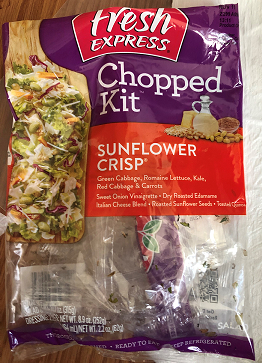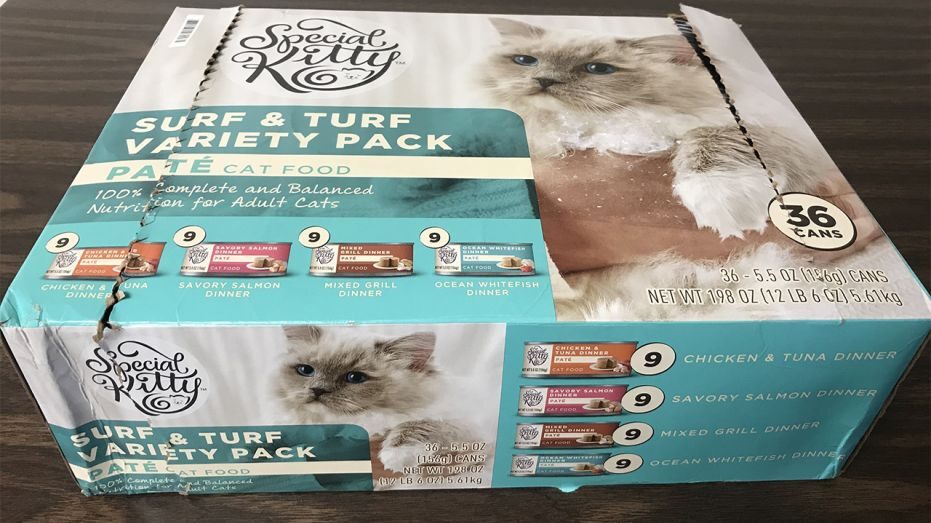CDC, public health and regulatory officials in several states, and FDA are investigating a multistate outbreak of E. coli O157:H7. This investigation includes illnesses in Canada recently reported by the Public Health Agency of Canada. Fresh Express Sunflower Crisp Chopped Salad Kits have been linked to the outbreak. This outbreak was caused by a different strain of E. coli O157:H7 than the current romaine lettuce from the Salinas, growing region in California. WGS showed that bacteria isolated from ill people in the United States and Canada are closely related genetically, meaning that there is a common source of infection. As of December 9, 2019, a total of eight people infected with the outbreak strain of E. coli O157:H7 and three were hospitalized (one with HUS) from three states (Wisconsin, Minnesota, and North Dakota). No deaths have been reported. Data indicates that Fresh Express Sunflower Crisp chopped salad kits are a likely source of this outbreak. The ingredient that causes the illness is still under investigation. @ https://www.cdc.gov/ecoli/2019/o157h7-12-19/index.html
ruth
Food Safety Alert: A multistate outbreak of E. coli Infections Linked to Fresh Express Sunflower Crisp Chopped Salad Kit
ruth
The FDA announced that White Castle had initiated a voluntary recall of several frozen 6 pack cheeseburgers, frozen 6 pack hamburgers, frozen 6 pack jalapeno cheeseburgers, and 16 pack hamburgers, 16 pack cheeseburgers for the possible presence of Listeria monocytogenes. To date, public health officials have not reported any illness associated with these products. A recent sample conducted by a third party laboratory of White Castel’s frozen sandwiches from one manufacturing facility showed a presence of Listeria monocytogenes stopping any shipment of the product to customers. All impacted production runs have been identified for destruction. White Castle has maintained complete control of all products produced at the facility since the first indication of a problem. Since the recall, White Castle established intensive sanitation and cleaning with guidance from outside food safety experts, is aggressively elevating already strong food safety testing and manufacturing guidelines, and is conducting comprehensive testing to confirm no presence of Listeria in the facility. @ https://www.fda.gov/safety/recalls-market-withdrawals-safety-alerts/white-castle-frozen-food-division-announces-voluntary-recall-limited-production-frozen-sandwiches
White Castle has initiated a voluntary recall of a limited number of frozen 6 pack cheeseburgers, frozen 6 pack hamburgers, frozen 6 pack jalapeno cheeseburgers, and 16 pack hamburgers, 16 pack cheeseburgers for the possible presence of Listeria monocytogenes.
ruth
FDA and the Pennsylvania Department of Health (DOH) are investigating an outbreak of illnesses caused by Salmonella Javiana in Pennsylvania. Epidemiologic and traceback evidence indicate that fruit mix with cantaloupe, honeydew, pineapple, and grapes from Tailor Cut Produce of North Brunswick, New Jersey, are a potential source of this outbreak. Tailor Cut Produce reports that their products may be found in restaurants, banquet facilities, hotels, schools, and institutional food service establishments in New Jersey, New York, and Pennsylvania. The DOH reports that 31 laboratory-confirmed illnesses of Salmonella at four healthcare facilities in southeast Pennsylvania are linked to this outbreak. The state’s review of invoices shows that a common food eaten by many case-patients was the fruit mix with cantaloupe, honeydew, pineapple, and grapes from Tailor Cut Produce. On December 6, 2019, the FDA and the Pennsylvania DOH shared the results of the investigation thus far with the firm, and the firm’s leadership stated that they would work with FDA to implement a recall of this product. @ https://www.fda.gov/food/outbreaks-foodborne-illness/outbreak-investigation-salmonella-potentially-linked-tailor-cut-produce-fruit-mix-winter-2019?utm_campaign=Outbreak_FruitMix_12062019&utm_medium=email&utm_source=Eloqua
Food service companies and institutions in Pennsylvania, New York, and New Jersey should not serve cut fruit from Tailor Cut Produce
ruth
The FDA announced J. M. Smucker Company recalled specific lots of Special Kitty® wet, canned cat food due to health concerns potentially associated with ingredients believed to not meet the Company’s quality and safety standards. The specific product is Special Kitty® Mixed Grill Dinner Pate. In addition to being sold individually, this product is also sold as part of variety-packs. These products are sold in grocery stores nationwide and online. The investigation thus far indicates that the impacted product has been manufactured during a single day. @ https://www.fda.gov/safety/recalls-market-withdrawals-safety-alerts/j-m-smucker-company-issues-voluntary-recall-specific-lots-special-kittyr-wet-canned-cat-food-due?utm_campaign=The%20J.%20M.%20Smucker%20Company%20Issues%20Voluntary%20Recall%20of%20Specific%20Lots%20of%20Special%20Kitty%C2%AE%20Canned%20Cat%20Food&utm_medium=email&utm_source=Eloqua
The J. M. Smucker Company today announced a voluntary recall of specific lots of Special Kitty® wet, canned cat food due to health concerns potentially associated with ingredients believed to not meet the Company’s quality and safety standards.




